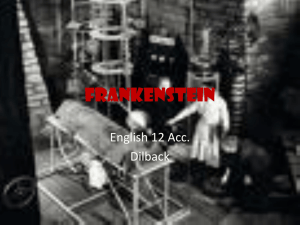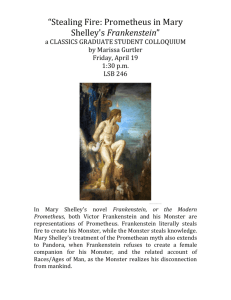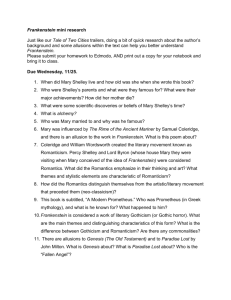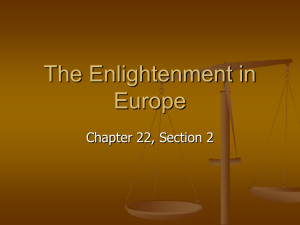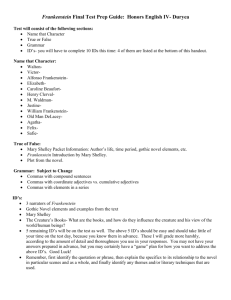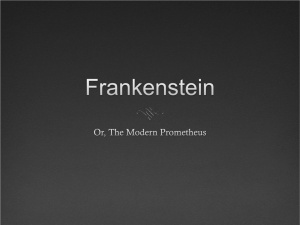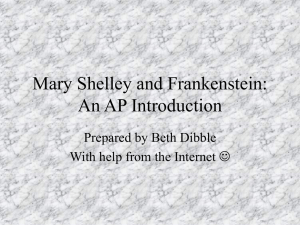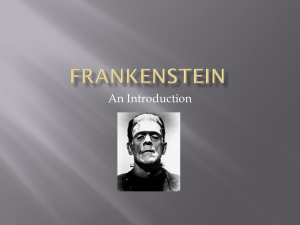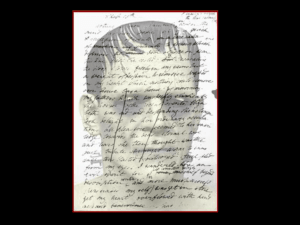Frankenstein by Mary Shelley: Analysis & Context
advertisement
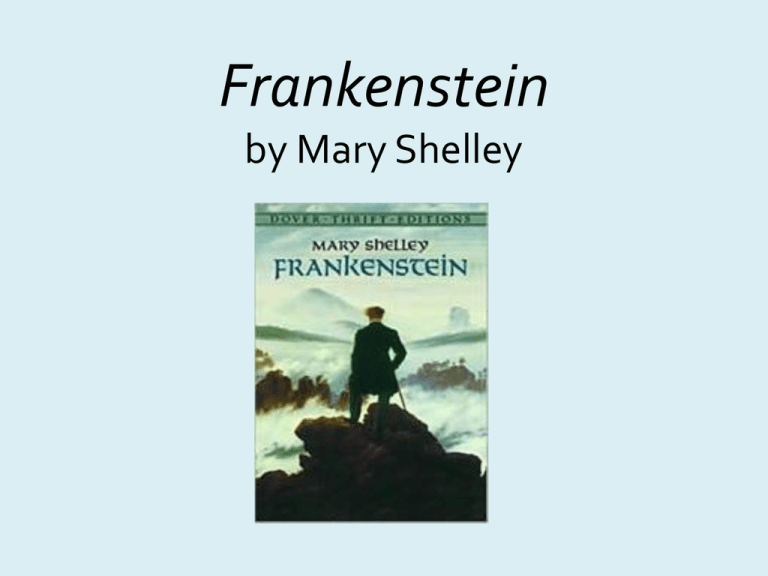
Frankenstein by Mary Shelley Author • Mary Wollstonecraft Godwin: born August 1797 in London, England. • Father: William Godwin, famous political philosopher; work attacked political institutions and aristocratic privilege. Author (cont.) • Mother: Mary Wollstonecraft, famous philosopher and feminist; work promoted education for women. • Husband: Percy Bysshe Shelley, famous Romantic poet. • Wrote Frankenstein at age 19; first published in 1818. • Mary Shelley died in 1851 (age 53) in England. Frankenstein: or The Modern Prometheus • Romanticism: embraced human emotion, imagination, nature, the exotic, unfamiliar, and distant. • Gothic fiction: Romanticism and horror. Structure • Frame Tale: story within a story; main narrative introduces a more emphasized narrative. • Introductory Frame Story: Robert Walton’s story; Arctic explorer who rescues Victor Frankenstein; writes letters to sister, Margaret. • Story within: Victor’s story and Creature’s experience. • Concluding Frame Story: back to Robert Walton; conclusion of his and Victor’s stories. Allusions • Frankenstein: The Modern Prometheus • Greek Mythology: Prometheus is a Titan who created mankind at Zeus’s request; teaches man to outsmart Zeus; Zeus takes away fire, but Prometheus steals it back; he is punished by Zeus. • Latin Mythology: Prometheus molds man out of clay and water; steals fire from the gods to give to man and is punished. Allusions (cont.) • Allusion: reference in a literary work to another literary work or a person, place, thing or idea of historical, political or cultural significance. • Bible • Paradise Lost: John Milton’s epic poem about the fall of man. • Rime of the Ancient Mariner: Samuel Taylor Coleridge’s poem about a man lost at sea. • Tintern Abbey: William Wordsworth’s poem about nature and memory. Characters • Which characters are members of Victor Frankenstein’s family? • Which other characters are related to each other? • Which characters work in the following fields: – Law? – Education? – Sea exploration? • What are the names of the characters you have not yet listed? Do Now: What image comes to mind when you hear the name Frankenstein? Describe or draw it in your notebook. Images of Frankenstein’s Creature Mary Shelley’s text: “… when, by the glimmer of the half-extinguished light, I saw the dull yellow eye of the creature open; it breathed hard, and a convulsive motion agitated its limbs… His limbs were in proportion, and I had selected his features as beautiful. Beautiful! Great God! His yellow skin scarcely covered the work of muscles and arteries beneath; his hair was of lustrous black, and flowing; his teeth of a pearly whiteness; but these luxuriances only formed a more horrid contrast with his watery eyes, that seemed almost the same color as the dun-white sockets in which they were set, his shrivelled complexion and straight back lips.” Graphic Novel • Text and images to tell story; novellength work if written in different format; fictional or non-fictional. • If we were making Julius Caesar into a graphic novel, which scenes would you include? List top five. What images would you include with the scene? • Rank your scenes in order of importance. • How might you convey to your audience that one scene is more important than another in a graphic novel? Do Now: • What scientific advancement recently occurred in the UK? • According to Article #1, what are people’s concerns about these recent scientific advancements? • According to Article #2, what is the goal of synthetic biology? • Is the writer of Article #2, for or against creating artificial life? • What conditions do the coalition against biotechnology advances wish to place on research? • What does Brent Ericksen believe drives people’s fear of biotechnology? • On what side of the debate do you stand? Do you think scientists should be able to create new life forms? Why or why not?
